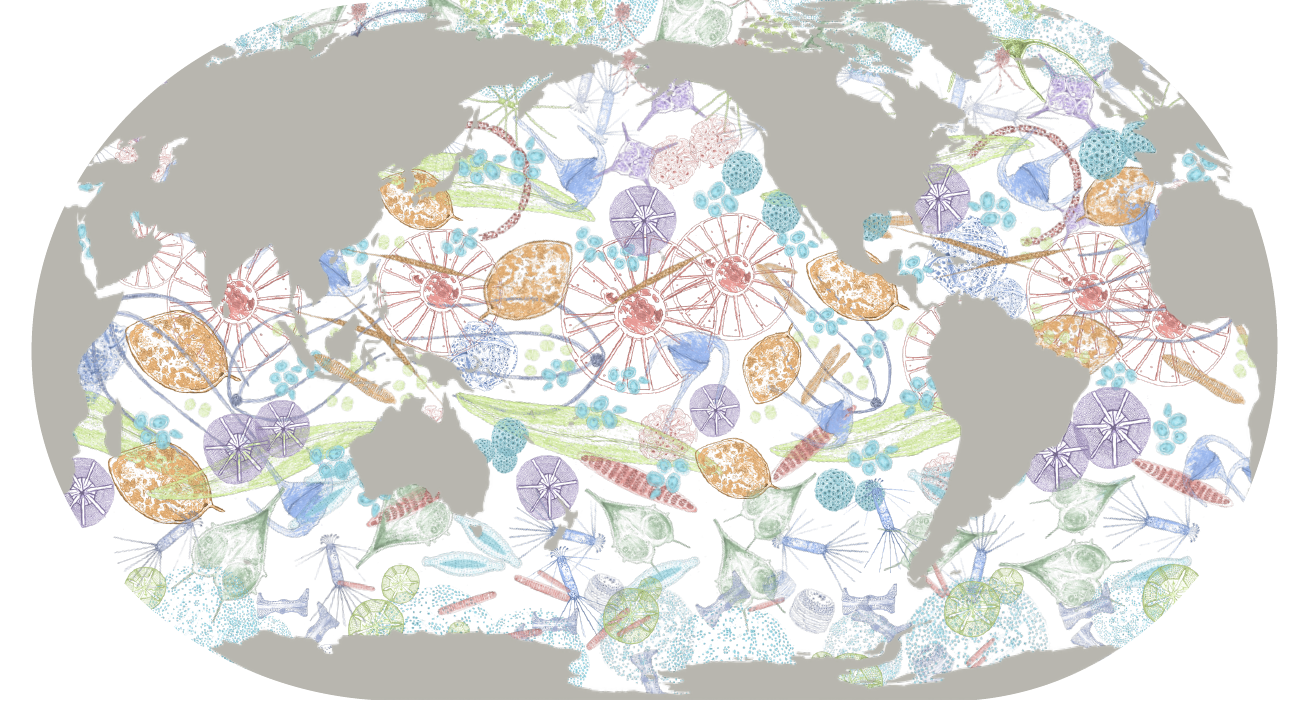Ocean Ecosystems and Ecology
Plankton are at the base of marine food webs and have a pivotal role in global oxygen production, nitrogen fixation, carbon sequestration and ultimately global climate dynamics. Phytoplankton are categorized with respect to their functional biogeochemical roles, including silicifiers (e.g., diatoms), calcifiers (e.g., coccolithophores), nitrogen fixers (e.g., cyanobacterium Trichodesmium). Similarly, zooplankton are often just distinguished based on the size class they belong to in marine ecosystem models. However, such traditional classification overlooks complex aspects of biodiversity in planktonic ecosystems such as their vulnerability to changing environmental conditions and associated consequences on primary production, grazing and export of organic carbon. Understanding how environmental conditions shape the distribution, biodiversity, and community structure of plankton to improve existing marine ecosystems and climate models, thus better project potential future changes in these systems, is a leading research topic in our group.
We combine in situ observations of plankton and the physical and chemical characteristics of the water masses they live in with a range of machine learning and modeling techniques to produce accurate and robust marine ecosystem models, species distribution and associated biodiversity maps. We develop our research beyond traditional in-situ observations by integrating functional trait data, or incorporating data derived from cutting-edge -omics or quantitative imaging techniques to understand the multifaceted dimensions of marine plankton biodiversity and how they affect biogeochemical cycles in present and future environmental conditions. Together with data repositories and modeling platforms, we actively participate in collaborative efforts within the AtlantECO, Bluecloud2026 and BIOcean5D projects. These projects aim to integrate global marine data and produce high quality, up-to-date, inter-comparable and publicly available estimatesions of plankton biodiversity, a key component of the digital twin of the ocean (DTO).
Current research topics:
- Global patterns and drivers of plankton biodiversity
- Relationships between plankton biodiversity and ecosystem functioning
- Ocean partitioning and ecosystem structure from plankton composition
- Integrate traditional in-situ observations, quantitative imaging, and omics to produce robust diversity estimates.
People involved:
Meike Vogt
Fabio Benedetti
Alexandre Schickele
Corentin Clerc
Urs Hofmann Elizondo
Dominic Eriksson
Stefanie Mayer
Key publications:
Eriksson, D., Gruber, N., Benedetti, F., Righetti, D., Paoli, L., Salazar, G., Sunagawa, S., & Vogt, M. (2023). Nitrogen fixation rates increase with diazotroph richness in the global ocean. EcovoRxiv. In prep. external page https://doi.org/10.32942/x2z323
Knecht, N. S., Benedetti, F., Elizondo, U. H., Bednaršek, N., Chaabane, S., De Weerd, C., Peijnenburg, K. T. C. A., Schiebel, R., & Vogt, M. (2023). The impact of zooplankton calcifiers on the marine carbon cycle. Global Biogeochemical Cycles, 37(6). external page https://doi.org/10.1029/2022gb007685
Benedetti, F., Gruber, N., & Vogt, M. (2023). Global gradients in species richness of marine plankton functional groups. Journal of Plankton Research, 45(6), 832–852. external page https://doi.org/10.1093/plankt/fbad044
Benedetti, F., Vogt, M., Elizondo, U. H., Righetti, D., Zimmermann, N. E., & Gruber, N. (2021). Major restructuring of marine plankton assemblages under global warming. Nature Communications, 12(1). external page https://doi.org/10.1038/s41467-021-25385-x
Elizondo, U. H., Righetti, D., Benedetti, F., & Vogt, M. (2021). Biome partitioning of the global ocean based on phytoplankton biogeography. Progress in Oceanography/Progress in Oceanography, 194, 102530. external page https://doi.org/10.1016/j.pocean.2021.102530
